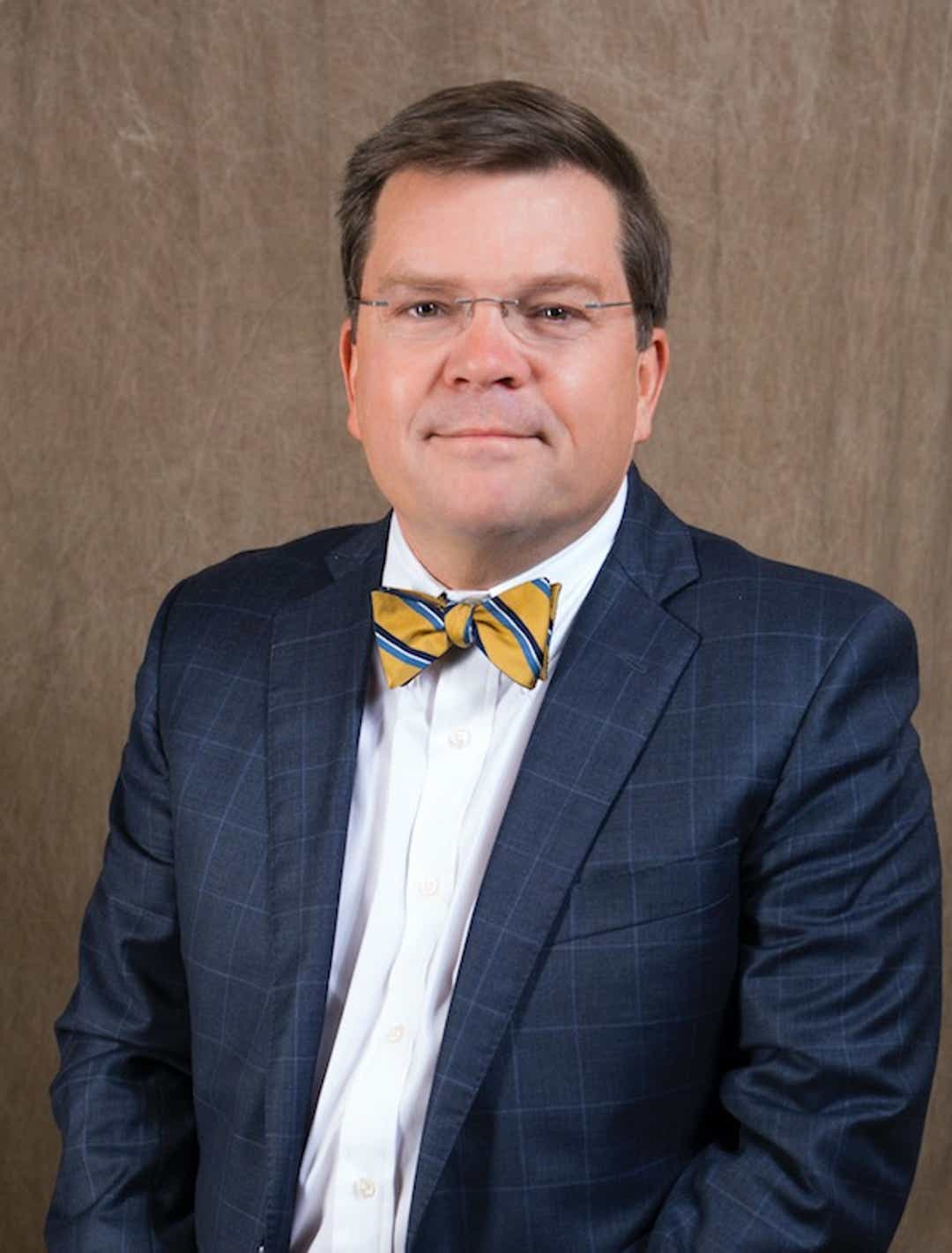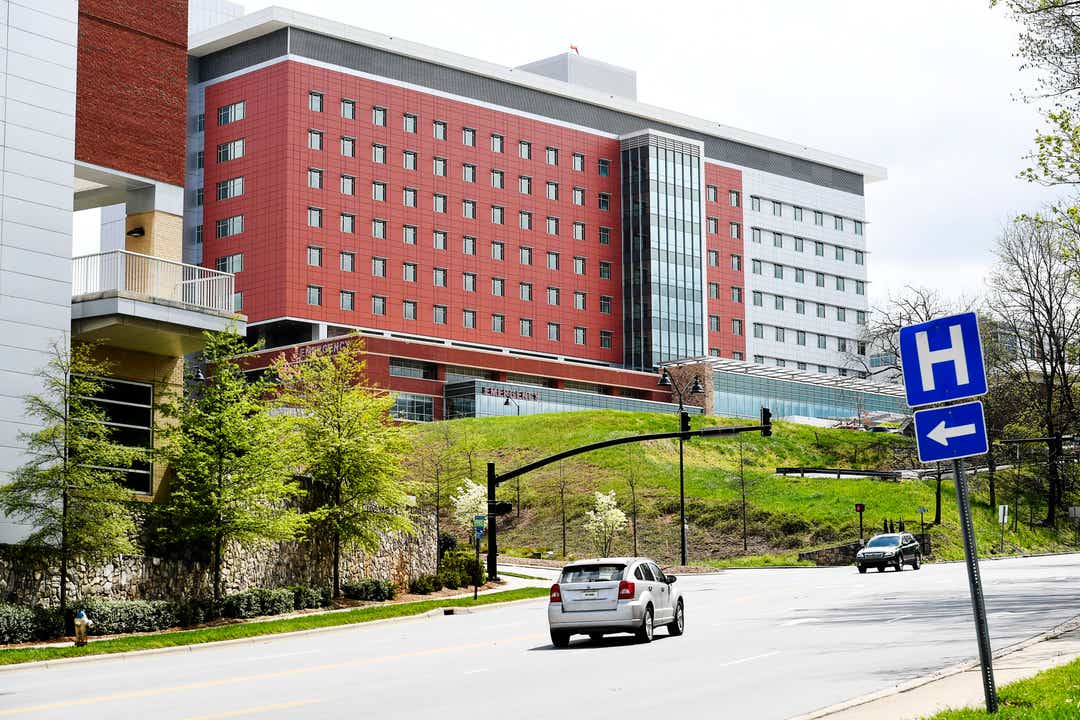
Harmony Owen, a wife and mother of two in West Asheville, said she’s seen a change in how Mission Health provides care for patients who cannot pay. Owen preferred the old charity care system, before HCA Healthcare took over Mission in February 2019.
“We used charity care prior to the switchover several times, both myself and my husband,” Owen said. “Before, it was definitely more accessible and easier to apply.”
The American Hospital Association defines charity care as “care for which hospitals never expected to be reimbursed.” Hospitals offer this cost forgiveness to patients unable to cover their medical bills through their own finances or insurance.
On condition of purchasing Mission Health, HCA pledged to maintain the system’s existing uninsured and charity care policy for at least ten years. But a year after buying Mission, HCA faced questions surrounding how it implemented the policy. .
This winter, residents voiced complaints at public compliance meetings across the region. Local politicians and health care advocates challenged HCA to provide more transparency around their charity care implementation.
“Because HCA structures its charity care differently than Mission did previously, there was some confusion about how they did things and how people would go about receiving charity care,” said Victoria Hicks, who serves on the board of Health Equity Coalition of Western North Carolina.
On Feb. 25, North Carolina Attorney General Josh Stein wrote a letter to Greg Lowe, president of HCA’s North Carolina Division. In his letter, Stein cited "concerns with the way in which HCA's charity care and uninsured patient policies appear to have been implemented."
He listed four specific concerns:
- HCA wrongly understands charity care to cover only urgent needs.
- It is not easy for doctors or patients to learn how the charity care policy is applied.
- The policy is not consistent with the Asset Purchase Agreement.
- Mission's own website doesn't describe the policy on financial need in the same way as that agreement.
Stein demanded HCA provide responses and data on nine questions to illustrate the “total amount of care” HCA provided through its charity care policy. After twice extending the deadline for HCA’s response, once due to COVID-19, Stein received Lowe’s charity care answers on April 30.
More: 'Critically understaffed': Asheville crowd vents frustrations with Mission Health and HCA
Attorney General Josh Stein asks HCA to answer concerns about care, billing
Under HCA, more help but more costs
In its first year under HCA ownership, Mission Health reported providing $42.5 million more in charity care than the non-profit Mission gave the year prior to HCA’s arrival. When accounting for additional financial assistance programs non-profit Mission Health lacked, HCA reported giving $108 million more in aid to about 20,000 more patients in its first year than Mission had during the 12-month period before HCA.
Yet greater discounts have come during a time of greater costs.
For the four years before HCA took over, Mission had increased medical service charges by approximately 6.8% a year. In October 2019, Mission Health increased medical service charges by 10%.
According to Lowe, this increase “was supported by a market survey obtained from a third-party consultant.” Mission declined to provide a copy of the market survey or give the name of the third-party consultant.
At Mission, higher costs have led to higher revenues. According to Lowe’s response, in the 12-month period before HCA’s acquisition, Mission Health took in just shy of $5.3 billion in gross revenues for patient services. In the 12 months after HCA’s purchase, gross revenues from patient services at Mission Health exceeded $5.85 billion, a net increase north of $545 million.
More: HCA-Mission's independent monitor got an earful. What happens now?
Patient care to staff safety: Concerns over HCA's management of Mission run deep | OPINION
Wanting the old policy back
Having experienced charity care before and after HCA acquired Mission, Harmony Owen said one key difference is how long charity care approvals last.
At the non-profit Mission, patients approved for charity care would be approved for an extended period of time, like three or six months, during which their bills would be covered by the policy.

In a March 2 meeting at the Citizen Times, Dr. William Hathaway, Mission Health’s chief medical officer, described how HCA’s charity care policy is much more “episodic.” Instead of getting a set number of months during which their bills are covered by charity care, Mission patients now apply for charity care for every bill.
“The HCA care policy is more on an episodic basis, because we found that many patients actually qualify for Medicaid or other federal programs to get reimbursement,” Hathaway said. “And by checking in on a regular basis, we can make sure that they're getting the assistance they need, which is much better than having a charity care policy.”
Hathaway said HCA’s charity care setup is more standard for both for-profit and not-for-profit hospital systems across the country.
However, for Owen, whose husband underwent two back surgeries in the past year, frequently applying poses an issue.
“We are currently getting final notices from some of these places, and we're still waiting on either our application to go through, or to receive the application,” she said. “It's been a very huge strain on our family because of our finances.”

Owen, who works as a caretaker for her child with autism, said it’s difficult to get connected with the proper department to address her application questions. Several of Owen’s questions revolve around the minimum amount of $1,500 that bills must meet to be eligible for HCA’s charity care policy.
This minimum, Owen said, did not exist in the old Mission policy (the policy at the non-profit Mission did include certain visit fees ranging from $10 to $500).
“We were also told that if we didn't have a bill that was $1,500 or more specifically with Mission, then we weren't going to get approved,” Owen said.
According to the current HCA charity care policy, patients can request financial assistance for balances less than $1,500 “if there are extenuating circumstances.”
More: 'We have no doctor here': Rural residents voice concerns at HCA compliance meeting
Which 'emergent' services get covered?
To be eligible for HCA Mission’s charity care policy, patients must have received “emergent, non-elective services.” Yet, knowing precisely what “emergent” means is not always clear.
John Romley, senior fellow at the University of Southern Carolina’s Schaeffer Center for Health Policy and Economics, said “emergent” lacks one unified definition among hospitals.
“I don't think there is a 100% clear answer here,” Romley wrote in an email. “The reason this isn't simple is that my understanding is that providers have been interpreting the terms in different ways. There is some gray.”
During the early weeks of COVID-19, as hospitals prioritized certain services over others, the Centers for Medicare and Medicaid Services issued guidance that broadly defined “emergent” care as services that “save a life, manage severe disease, or avoid further harms from an underlying condition.”
In his letter to HCA, Josh Stein referenced the ambiguity around which emergent services were included in HCA’s charity care policy.
“There is no list available of what procedures meet these criteria, and we have heard from patients and physicians that they are confused about whether particular treatments are eligible under the policies,” Stein wrote.
In his response to the Attorney General, Lowe said all services that take place in hospital emergency departments count as emergent and get covered by HCA’s charity care policy. Yet services that take place outside emergency departments, Lowe said, may or may not constitute as emergent and therefore may or may not be eligible for charity care.
Lowe wrote that HCA doesn’t state which of these non-emergency department services are eligible for charity care. Instead, Lowe said, the determination comes down to the “expertise of our team members, since clinical needs can differ greatly from patient to patient.
"We believe this clinical flexibility benefits patients more than a pre-established list of eligible procedures would.”
More: Mission nurses seek union election. What happens now?
Hathaway's workload
In his letter to HCA, Attorney General Stein also faulted Mission’s process of having charity care decisions run through the chief medical officer, Dr. William Hathaway.
"He is clearly approaching these duties in a principled and thoughtful way,” the Attorney General wrote of Dr. Hathaway. “But his busy schedule makes it impossible for physicians to easily contact him.”
Since 2013, Dr. William Hathaway has been Chief Medical Officer of Mission Health. Hathaway is tasked with overseeing charity care’s “escalation process.” Through this process, patients whose procedures occurred outside emergency departments can appeal to have their services categorized as emergent and thus eligible for financial assistance.
In his response to Josh Stein, Greg Lowe wrote that Hathaway’s team currently reviews four to five escalation cases each week. Lowe attested this weekly case load is lower now than during the time immediately after HCA purchased Mission as staff become more familiar with new financial assistance programs under HCA. Lowe credited heightened staff awareness of financial assistance policies to Hathaway’s efforts.
More: Mission and nurses' union jockey over who gets to vote in union election
What happens now?
If Josh Stein finds HCA to be out of compliance with its charity care promises, he can step in on behalf of the public to demand HCA make changes.
“If worse comes to worse, where they (HCA) won't agree to live up to their commitments, we could always go to the North Carolina Business Board," Stein told the Citizen Times on March 11.
Charity care was just one of four topics of concern cited by Stein in his Feb. 25 letter. He also discussed quality of care, billing transparency and the status of a sexual assault nurse examiner, or SANE, at Angel Medical Center in Franklin.

The Attorney General’s office considers one of these matters resolved and the rest ongoing.
“Our office considers the SANE nurse matter resolved,” said NC Department of Justice Communication Director Laura Brewer in an email. “We continue to review the materials HCA has provided and look forward to ongoing conversations to continue to learn more about the other topics.”
HCA also declined to offer more details into topics raised in its response to Josh Stein.
“As you know, the Attorney General has requested specifics about the application of our charity care and financial assistance policies,” wrote Mission Health Spokeswoman Nancy Lindell in a statement to the Citizen Times.
“We provided those specifics and we are planning to meet with his team in the near future to discuss any outstanding questions they may have.”
More: What Mission management and nurses can (and can't) do during a union drive
Brian Gordon is the education and social issues reporter for the Citizen Times. He's won awards for stories on schools and guinea pigs. Reach him at bgordon@citizentimes.com or on Twitter @briansamuel92.
Keep local journalism possible with a subscription to the Citizen Times.
"care" - Google News
May 24, 2020 at 05:17PM
https://ift.tt/3cYtetB
Patient criticisms and HCA's response: What to know about Mission charity care - Citizen Times
"care" - Google News
https://ift.tt/2N6arSB
Shoes Man Tutorial
Pos News Update
Meme Update
Korean Entertainment News
Japan News Update
Bagikan Berita Ini














0 Response to "Patient criticisms and HCA's response: What to know about Mission charity care - Citizen Times"
Post a Comment